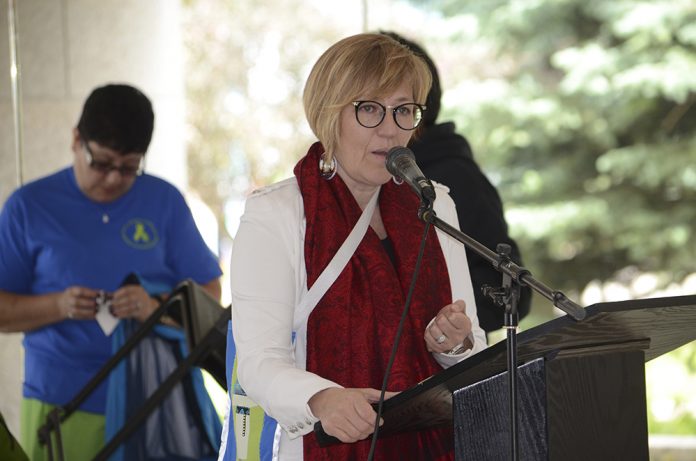
The National Inquiry into Missing and Murdered Indigenous Women and Girls hit another snag on Monday, as a Saskatchewan-based commissioner resigned over what she called a “colonial” process.
Marilyn Poitras, an assistant professor at the University of Saskatchewan, faulted the “structure” of the inquiry in her resignation letter to Prime Minister Justin Trudeau. In a statement Tuesday, she said she expected the inquiry would rely on Indigenous traditions and travel to “as many places as possible.” But she said those hopes were dashed.
“I realized the vision I hold is shared (by) very few within the National Inquiry,” she wrote. “The status quo colonial model of hearings is the path for most.”
The inquiry was created to examine systemic causes for the disproportionately high number indigenous women and girls who’ve disappeared or lost their lives to violence. According to police estimates, about 1,200 have been reported missing or murdered – though other authorities have put the real number much higher.
Indigenous and Northern Affairs Minister Carolyn Bennett spoke to reporters after the resignation, saying that the inquiry will go on despite Poitras’s departure. The minister said she met with the commissioners on Monday and learned their “plan to fulfill their mandate in light of the resignation.”
She admitted, however, that they must “do a better job of communicating their plan.”
“Successful commissions bring Canadians along with them as they go, and this has not been done to date,” Bennett said.
The inquiry has faced months of criticism from indigenous leaders, who say it has done too little to keep families informed of its progress. Poitras’s resignation comes days after another barrage of controversy. Just last week, the inquiry released its meeting schedule, which includes only one Saskatchewan stop – in Saskatoon. Though Poitras did not specifically mention the schedule in her statement, critics have said one week of hearings is insufficient to ensure all families are heard.
Georgina Jolibois, MP for Desnethé-Missinippi-Churchill River, said families across her massive northern riding will have great difficulty travelling to the hearings. Many have contacted her, she said, saying they want to participate, but might not be able to afford the trip.
“The hearing in Saskatoon does not accommodate constituents in northern Saskatchewan,” she said. “The cost of getting to Saskatoon will be very high.”
Jolibois said the loss of the Saskatchewan Transportation Company only exacerbates the problem. In her view, it’s entirely “feasible” for the inquiry to hold more than one hearing in northern Saskatchewan.
“When the Royal Commission on Aboriginal (Peoples) was done in the 1990’s, they came to communities. I remember there was a hearing in La Loche, a hearing in La Ronge, and a few other places. Northern Canada was accommodated,” she said. “In this process, it’s very important that northern communities are accommodated.”
Vice Chief Heather Bear of the Federation of Sovereign Indigenous Nations said she raised similar concerns in discussions with the commissioners last month. She said she forwarded recommendations from the First Nations Women’s Commission calling for a less legalistic, more accessible process, and for visits to the north and south of the province.
“We were assured that our recommendations were taken seriously,” she said.
Bear said she was “disappointed” to hear about Poitras’s resignation, and understands the issues the commissioner raised in her statement. But the vice chief resists calls to start over, saying there’s still plenty of time to learn from past mistakes.
“I appreciate the points she has made; it gives an opportunity for us to help fix it,” she said.
Bear called on the government to quickly replace Poitras. She said that Saskatchewan has a deep pool of talented indigenous women who could take her place. As for the other four commissioners, she’s confident they have what it takes to lead.
“I don’t think it’s a matter of changing commissioners. I think these commissioners are well equipped. They have the tools and they have the knowledge,” she said.
“We need this inquiry,” she said. “It cannot fail.”

